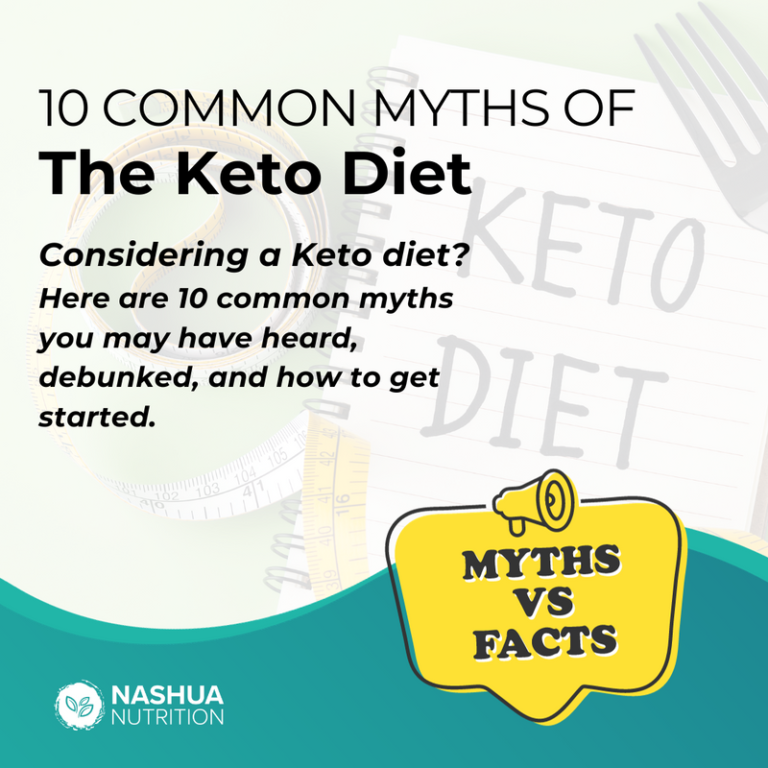Debunking the Top 10 Keto Diet Myths
The Keto diet has taken the world by storm, promising transformative weight loss results. But with its rise in popularity, a number of myths have emerged, leaving many confused and bewildered. If you’re considering the Keto path to lose those extra pounds, it’s important to separate fact from fiction. Let’s dive deep into the top ten myths surrounding the Keto diet.
On your Keto journey, it’s important to make informed choices. For those looking to start down this path of transformation, check them out Keto friendly products to start your journey.
Myth #1: The keto diet is all about protein
Contrary to popular belief, the Keto diet is not about loading up on protein. It is a high-fat, low-carb regimen with moderate protein intake. This balance is crucial to push your body into ketosis, where it uses fat for energy instead of carbohydrates.
Myth #2: Eating fat melts away body fat
It is a misconception that simply eating fat will melt away body fat. The Keto diet emphasizes fat to ensure your body has a source of energy in the absence of carbohydrates. It’s the state of ketosis that encourages your body to tap into its fat stores.
Myth #3: Keto equals ketoacidosis
Many confuse ketosis with ketoacidosis, a dangerous condition. While both involve elevated ketone levels, ketoacidosis is a medical emergency seen primarily in type 1 diabetics. In contrast, ketosis is a natural state the body enters when food intake is low.
Myth #4: Saturated fat is a heart breaker
Recent research has debunked the myth that saturated fat is the only bad thing for heart health. While it is essential to choose healthy fats on the Keto diet, factors such as inflammation, stress, and the overall quality of the diet are just as critical.
Myth #5: Keto leads to nutrient deficiencies
With proper planning, the Keto diet can be nutritionally rich. Prioritize whole foods, leafy greens and quality protein sources to ensure a balanced diet.
Myth #6: Keto = Constipation
While some experience constipation when transitioning to Keto, it’s not a given. Stay hydrated and include low-carb, high-fiber vegetables to keep things moving.
Myth #7: Keto is a short-term diet
Many believe that Keto is a quick fix. However, many individuals have adopted it as a long-term lifestyle, reaping lasting benefits such as improved energy and mental clarity.
Myth #8: Keto is expensive
While some Keto products can be expensive, many affordable options fit the diet perfectly. Planning and smart shopping can make Keto budget friendly.
Myth #9: You can’t exercise on Keto
Another misconception is that Keto depletes your energy, making exercise impossible. Instead, once they adapt, many find they have more stamina and endurance on Keto.
Myth #10: Keto is just another fad diet
With its roots in medical research and countless success stories, Keto is here to stay. It’s not just another fad, but a science-backed approach to health and weight loss.
Benefits of the Keto Diet
- Weight loss: One of the most famous benefits of the Keto diet is weight loss. By burning fat as the main source of energy, many people find it easier to lose those extra pounds.
- Enhanced Energy: Once past the initial transition phase, many keto dieters report a steady increase in their energy levels, without the crashes associated with high-carb diets.
- Mental Clarity: The brain loves ketones! Many people on Keto report improved focus and clarity, making it easier to tackle everyday tasks.
- Stable blood sugar levels: By reducing carbohydrate intake, the Keto diet can help stabilize blood sugar levels, which is especially beneficial for those with type 2 diabetes.
-
Improved heart health: Contrary to popular belief, the Keto diet can improve heart health by increasing levels of “good” HDL cholesterol and lowering “bad” LDL cholesterol.
Starting with Keto
- Understand the Basics: Before you dive in, understand what Keto is. It’s a high-fat, low-carb diet that shifts your body into burning fat for energy.
- Plan your meals: Start by planning your meals. Focus on foods high in fat and low in carbohydrates. Include plenty of vegetables, lean meats and healthy fats.
- Stay hydrated: Drink plenty of water. As your body goes into ketosis, it’s essential to stay hydrated to help flush out toxins.
- Beware of “Ketoflu”: As you begin, you may experience the “keto flu” – a cluster of symptoms that can include headaches, fatigue and irritability. It’s a sign that your body is adjusting and it’s temporary.
- Supplement wisely: Think supplements to ensure you get all the nutrients you need. Magnesium, Vitamin Dand Omega-3s are good places to start.
- Explore Keto Friendly Products: To make your journey smoother, explore Keto Friendly Products at Nashua Nutrition. From snacks to meal replacements, they have a range of products to keep you on track.
Remember, diets are not universal. Your health conditions, goals and individual needs dictate what is best for you. Always consult a healthcare professional before making dietary changes.
Stay informed, get inspired and here’s to being healthier!
← Previous post
